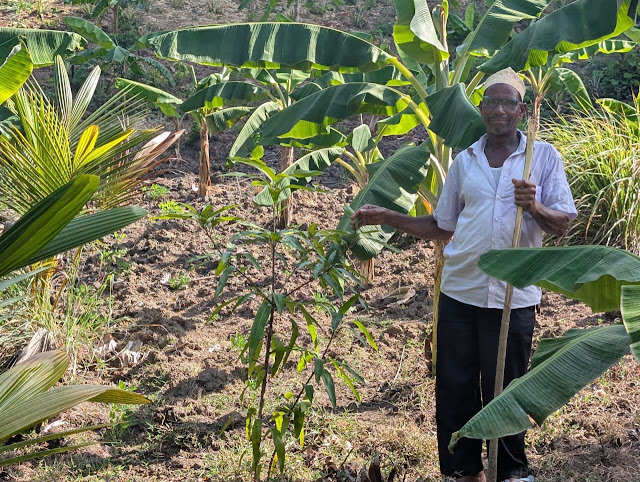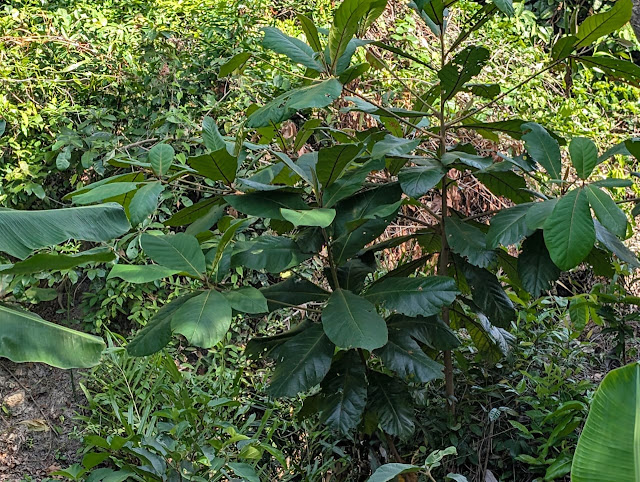BY, KHELEF NASSOR, ZANZIBAR@@@@
In Kambini Mchangamdogo, a small village on Pemba Island, lives Bakari Khamis Bakari, a man whose resilience and determination overcome great challenges. A devoted father of seven, Bakari has refused to let his physical disability—an impairment in one of his legs—limit his aspirations. Instead, he has become a driving force of inspiration, proving that people with disabilities can be at the forefront of climate adaptation efforts.
Bakari’s journey into
agroforestry began when he was mobilized and trained by Community Forests Pemba
through the Zanzibar Women Leadership in Adaptation (ZanzADAPT) project.
The Zanzibar Women
Leadership in Adaptation (ZanzADAPT) project, under which Bakari was trained,
aims to foster women’s leadership in climate resilience efforts. By equipping
women and marginalized groups with knowledge, skills, and resources, the
project promotes inclusive solutions to climate change challenges.
Despite initial skepticism
from the community, he embraced sustainable farming practices, determined to
create a better future for his family and contribute to environmental
conservation.
Bakari
stands proudly in his diverse agroforestry farm, a testament to his dedication
and the power of sustainable farming for a resilient future
On his one-acre farm,
Bakari has cultivated a diverse mix of trees and crops, including bananas,
mangoes, pineapples, avocados, coconut palms, cinnamon, and forest trees. His
agroforestry initiative not only helps combat climate change by promoting
biodiversity and soil conservation but also will provide a sustainable source
of income for his household. However, Bakari has yet to reap the benefits of
his farm, as he only recently planted his crops following his training under
the ZanzADAPT project. His agroforestry journey is still in its early stages,
requiring patience, dedication, and continued support.
Initially, many in his
village doubted his ability to farm. However, as his crops flourished and his
dedication remained unwavering, perceptions began to shift. Today, Bakari
receives tremendous support from his community, a testament to his perseverance
and the power of inclusive environmental action.
Yet, his journey has not
been without challenges. Water scarcity poses a significant threat to his
crops, and the intrusion of livestock into his farm disrupts his hard work.
Despite these setbacks, Bakari remains undeterred. He calls upon stakeholders
and the broader community to provide support, not only to him but to all people
with disabilities who aspire to contribute to climate adaptation and
environmental conservation.
"People with
disabilities have the right to participate fully in the fight against climate
change. We should not be overlooked or underestimated," says Bakari.
"I urge my fellow persons with disabilities not to stay at home feeling
incapable. We have the ability to make a difference and build a sustainable
future."
Bakari's story is a
powerful reminder that climate adaptation is a collective effort. It requires
the inclusion of all individuals, regardless of physical ability. His
determination and hard work illustrate that disability is not inability. With
the right support and opportunities, people with disabilities can lead the
charge in environmental conservation and community resilience.
As Bakari continues to
nurture his farm, he remains hopeful that his agroforestry venture will not
only preserve the environment but also transform his economic future. His
vision is clear: a world where people with disabilities are recognized as key
players in climate action and community development.
Bakari stands as a living
testament that true strength lies not in physical ability, but in resilience,
determination, and the will to create change.
Rehema Alawi, an
Agroforestry Officer from Community Forests Pemba, has been closely supervising
Bakari’s progress. She is inspired by his determination and dedication.
“Bakari’s commitment to agroforestry sends a strong message that disability is
not inability. His farm is proof that with the right support, people with
disabilities can be at the forefront of climate adaptation,” she says.
Rehema emphasizes the
importance of inclusive environmental conservation. She urges policymakers and
development partners to create more opportunities for people with disabilities
in climate action programs. “Empowering persons with disabilities in
agroforestry not only promotes environmental sustainability but also
strengthens community resilience. Their contributions should be recognized and
supported,” she adds.
Bakari's journey is a true example of the fact that determination knows no boundaries. His success is a symbol of hope, showing that people with disabilities can be leaders in environmental conservation and climate resilience. As he continues to nurture his agroforest, he remains a powerful advocate for inclusivity and sustainability, proving that every individual has a role to play in protecting our planet.
Terminalia
catappa, a thriving forest tree now planted on Bakari's farm, flourishing
beautifully and adding life to the landscape




Comments
Post a Comment